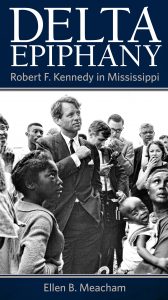University of Mississippi journalism professor Ellen Meacham details Robert F. Kennedy’s visit to the Mississippi Delta in 1967 in her new book Delta Epiphany: RFK in Mississippi.
Meacham’s book, published by University Press of Mississippi, examines the history, economics and politics of the Delta and how those factors influenced the lives of people whom Kennedy met there during that visit. She will sign copies at 5 p.m. Wednesday, April 18, at Square Books in Oxford.

The book was inspired by a description from fellow journalist Curtis Wilkie’s memoir of Kennedy in a dark shack trying to speak to a toddler who was paying more attention to crumbs on the floor.
“I wondered about the impact it had on Kennedy, because it’s mentioned as an important moment in all of his biographies,” Meacham said. “The next question I had was, ‘What happened to the baby?’”
After seven years of searching, Meacham found and interviewed children from the four families Kennedy encountered on his visit, including that toddler.
 “As I got into the research, I realized pretty quickly that there was a big part of the story that had not been told,” she said. “Most of the contemporary news accounts and later historians had only looked at RFK on the stage. The people who were living the lives that moved him so were more of a ‘poverty stage set.’”
“As I got into the research, I realized pretty quickly that there was a big part of the story that had not been told,” she said. “Most of the contemporary news accounts and later historians had only looked at RFK on the stage. The people who were living the lives that moved him so were more of a ‘poverty stage set.’”
Meacham wanted to tell the stories of those people.
“It became very important to me to bring those families into the light and find out how they came to be in that place at that time, what struggles they faced and their accomplishments since,” she said. “I think it brings more balance.
“It’s not just a story of a hero or a saint, it’s about a real person meeting real people.”
The book also features about a dozen photos, including the cover, that are published for the first time.
“The photographs were essential to telling this story,” Meacham said. “They brought such a vivid realism that showed the impact of the visit on Kennedy in a powerful way.”
A working journalist for more than two decades, Meacham used her experience as a newspaper reporter in Mississippi, which gave her access to contacts within both politics and journalism in the state, putting her in a unique position to tell these stories.
“Ellen Meacham is a talented and perceptive journalist who recognized, nearly a half-century after the fact, the great impact of Robert Kennedy’s brief trip to the Mississippi Delta in 1967,” said Wilkie, a UM associate professor of journalism and fellow of the Overby Center for Southern Journalism and Politics.
“It was a mission that changed his life, the tortured history of that region and the nation’s attitude toward hungry people in America. Though Ellen was not old enough to have been there, her investigation of the story has brought it back to life, and it is an example of her valuable work.”
By Christina Steube


